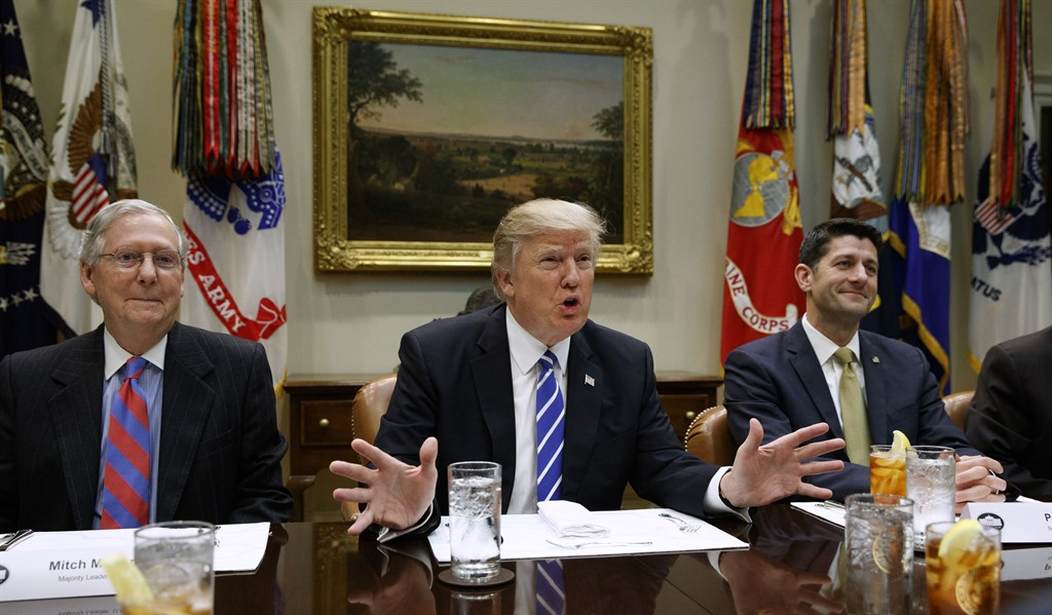Until today, the border-adjustment tax plan remained stuck at the mostly dead stage. In a rare coordinated communications strategy between the White House and Congress, Republicans finally killed off the BAT proposal entirely. Their joint statement highlighted the “unknowns” of the policy in their decision to go after more traditional tax reform:
The Trump administration and GOP leaders on Capitol Hill’s intend to drop a contentious border adjustment tax from an effort they announced Thursday to send an ambitious tax overhaul bill to President Donald Trump’s desk.
The BAT would have slapped taxes on imports and exempt exports, but the White House and GOP lawmakers have agreed “there are many unknowns associated with it.” That led them to announce they have “decided to set this policy aside in order to advance tax reform” despite seeing some potential “pro-growth benefits.”
According to a statement from House Speaker Paul Ryan’s office, the need to pursue BAT has been eclipsed by a new unity on other approaches to stimulating the economy:
What about BAT? The overarching goal of tax reform is more important than any single policy. We agreed to move forward without BAT once we determined there is a viable alternative that still creates a level playing field for American businesses.
Hmmmm. It looks more like an acknowledgment that BAT could drag down the entire tax-reform effort. Opposition to a border-adjustment tax plan emerged almost as soon as the proposal itself did. Steve Forbes warned in early January that Republicans were playing with fire in their attempt to appease the populist base. Yes, it would provide strong disincentives to importers, but that would drive up consumer prices, Forbes argued. Meanwhile, the biggest corporations would score immense tax breaks on exports:
Here’s how, in essence, this sneaky, anti-consumer tax works. Importers will no longer be allowed to deduct an item as a business expense. To simplify things, let’s say a store imports a pair of sneakers for $40 and then sells them for $50, making a $10 profit on which it would owe taxes. Under the Republican plan, however, the retailer wouldn’t be able to deduct the $40 it paid for the sneakers. In fact, it would owe taxes on the entire $50! And who, ultimately, pays this tax? You, the consumer, in the form of higher prices or fewer choices of where you can shop. Retailers and their customers will be hit. …
But wait, it gets worse. Another feature of this bizarre GOP scheme gives exporters a gargantuan tax break by, in effect, not taxing their export revenues. Let’s say a corporation sells a piece of machinery to Iran for $5 million, which cost only $4 million to produce. That means $1 million in taxable profit. Under the new Republican scheme, however, that $5 million received from the mullahs wouldn’t be taxable. Instead of a $1 million profit, the corporation, for tax purposes, would have a $4 million loss. Loophole doesn’t begin to describe this “tax break.”
No wonder companies like Boeing, GE and other big exporters are orgasming over this GOP “reform.”
Needless to say, conservatives had a tough time buying into the BAT, which would have required the same kind of brinksmanship as we have seen on ObamaCare repeal to pass. Roll Call points out that the elimination of the BAT component has allowed for a return to … what was it called again? It’s been so long ….
Notably, the cadre of Republicans announced the tax bill-writing process will take place under regular order, meaning those panels will hold hearings and take the lead in writing the legislation. That is a departure from how Ryan and McConnell went about writing their various health care overhaul bills, during which they bypassed relevant committees and crafted bills behind closed doors. …
“Our expectation is for this legislation to move through the committees this fall, under regular order, followed by consideration on the House and Senate floors,” according to the statement. “As the committees work toward this end, our hope is that our friends on the other side of the aisle will participate in this effort.”
It’s still on a reconciliation track in the Senate, which means Democrats can’t really block its process if Republicans can unite behind it. That’s a big if, as we’re seeing over the last four months in dealing with ObamaCare repeal. Expect the White House to get more involved in the nitty-gritty of this bill, though, as this is the key to Trump’s economic agenda.
Rather than go after importers with tariffs and taxes, Republicans ought to consider a way to advance the interests of both conservatives and populists — by getting more assertive on anti-trust enforcement. Democrats have added that to their “Better Deal” agenda, and for good reason, but the fit is better with the GOP and their efforts to shrink government, as I write in my column at The Fiscal Times:
Clearly, this is a sop to Bernie Sanders and the progressive populists that provided what energy Democrats had in 2016. It should be effective for that purpose, but the rest of the policies outlined in “A Better Deal” offer nothing more than big government as the alternative. Sanders and his progressive followers see the power of the state as the only other alternative to consolidating corporate power. Progressives in Academia and coastal enclaves see themselves as benefiting from a shift toward that end, as they presume that they will benefit from it.
That ignores a key frustration among voters outside of those cultural and political power centers, however. They feel left out and cut off from the forces that impact their lives. Trading off Big Corporation for Big Brother only escalates the problem. They can see the impact of corporate consolidations in their communities in the storefronts on Main Street and the difficulty in starting businesses that compete with chain retail and service corporations. As manufacturers consolidated, they packed up operations and moved out of these communities, and the people who lived in them had fewer and fewer choices and options. Political parties ignored those fears or sometimes outright ridiculed them.
It’s that economic, cultural, and political disconnect that fueled populism on the Right, on which Donald Trump capitalized by acknowledging and legitimizing it. Republicans took this as a culture-war opportunity, but they’re missing a large part of the problem by overlooking Main Street economics.
Republicans may feel uncomfortable taking a more aggressive policy on antitrust enforcement, but it does fit with a dedication to small government and federalism. Increasing consolidation in the marketplace concentrates economic power into fewer hands, and economic power eventually will get expressed in political terms. Our massively complicated tax codes and regulations serve as traditional vehicles for rent-seeking behaviors by corporations less interested in free markets than in squelching competition.
That beats the BAT. And best of all, this is actually something the Trump administration could do on their own without Congress, although it would be easier and better if Congress played a role in this shift.








Join the conversation as a VIP Member